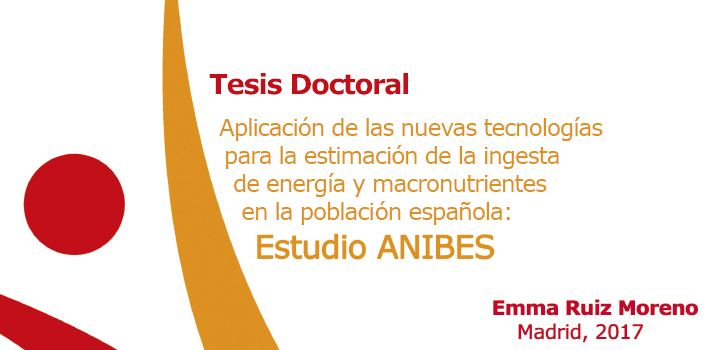Application of new technologies for energy and macronutrients intake estimation among the Spanish population: ANIBES Study

The Dietitian-Nutritionist Emma Ruiz Moreno, Project Manager of the Spanish Nutrition Foundation (FEN in Spanish), has presented and released the Doctoral Thesis titled: ‘Application of new technologies for energy and macronutrients intake estimation among the Spanish population: ANIBES Study’. This research work has been assessed by an evaluation panel through the Department of Health and Pharmaceutical Sciences, from the Faculty of Pharmacy of CEU San Pablo University (Madrid), with a distinction ‘cum laude’. ‘cum laude’.
In this sense, this Doctoral Thesis aimed at being able to determine energy and macronutrients consumption [proteins, lipids together with the various fatty acids families, carbohydrates (including starch, total, added and intrinsic sugars), as well as fibre and alcohol] and their food sources, for the different selected cohorts according to age and gender groups, through the ANIBES Study, conducted in a representative sample of the national population and using the advantages and opportunities offered by new technologies.
The advantage of the ANIBES Study compared to other similar studies is that it has brought together in a single study records of anthropometric data, food intake and its nutritional value, physical activity and socio-economic values. Current tools for the development of dietary surveys seem to be directed to the implementation of lists, inventories or previous automatized and standardized databases and which use new technologies. Although these achieve to represent or compile the great variety of foods, portion sizes and recipes, the huge diversity available for the population when it comes to select and mix foods in traditional or new recipes, typical of each geographic area and of each person, makes difficult and may have limitations if we try to conduct it with a previous structure, since it is not possible to previously include everything that people consumes in a database.
It must be noted that the ANIBES Study is much more precise, because the treatment of data is developed afterwards, getting a large amount of information for studying the complexity of dietary habits. Undoubtedly, the method used in this research work becomes more laborious (in the codification of photographs and descriptions) than other studies on the quality of the diet, but provide much more information than the 24-hour recalls, since they give information about brands in order to know the information more precisely, as well as the reality of the consumed portions or the leftovers in the intake of portions, both for foods and beverages.
Moreover, until now, no study on food and physical activity, being representative, has used new technologies (tablet devices and specific Apps) for the collection of information on diet, physical activity, anthropometric measures and other questionnaires among the Spanish population for a sample that represents the Spanish population and with distribution across the national territory and for populations over 2,000 inhabitants.
Among the main contributions, this work points out that the average energy intake is below the recommendations for the different age and gender groups. Moreover, according to the provided data, consumption of proteins and lipids (saturated and polyunsaturated fatty acids) is above the recommendations. On the contrary, the average contribution to energy from the fibre is far below the recommendations and monounsaturated fatty acids and carbohydrates do not meet the recommended values for any age or gender group.
Regarding the latter, just over half of the total energy contributed by carbohydrates comes from starches and the rest from total sugars. The contribution of intrinsic sugars is greater among the older populations, although, on the contrary, consumption of added sugars is significantly higher at an earlier age, especially during adolescence, reaching an average of 10% of the total energy consumed.
This research work concludes that energy and macronutrients contribution from the different food groups and subgroups throughout the day moves away from the Mediterranean Diet pattern, considered as moderate and healthy, being this more remarkable among the younger population groups.
Furthermore, taking into account the carefully designed protocol, based on the best available evidence and previous experience (pilot studies and other studies), the ANIBES Study contributes to provide useful data to support dietary policy planning, the development of guidelines based on the estimation of energy intake and expenditure and other actions geared towards health promotion and prevention. This work opens a new field of research in nutrition, highlighting the collection of data in the most accurate way, by using tools that enable a better and greater knowledge of the dietary consumption pattern according the distribution of the different times of consumption directly associated with energy and nutrients intake and the quality of the diet. This type of information can offer a temporary food distribution and its nutritional contribution, which can be useful for the development of recommendations and dietary guidelines that help to improve dietary habits.
Access to the full report on the Doctoral Thesis ‘Application of new technologies for energy and macronutrients intake estimation among the Spanish population: ANIBES Study’.
